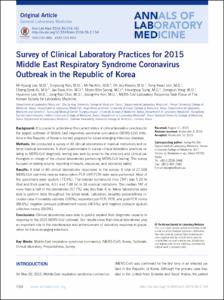KUMEL Repository
1. Journal Papers (연구논문)
1. School of Medicine (의과대학)
Dept. of Laboratory Medicine (진단검사의학)
Survey of Clinical Laboratory Practices for 2015 Middle East Respiratory Syndrome Coronavirus Outbreak in the Republic of Korea
- Keimyung Author(s)
- Ryoo, Nam Hee
- Department
- Dept. of Laboratory Medicine (진단검사의학)
- Journal Title
- Annals of Laboratory Medicine
- Issued Date
- 2016
- Volume
- 36
- Issue
- 2
- Keyword
- Middle East respiratory syndrome coronavirus (MERS-CoV); Korea; Outbreak; Clinical laboratory; Preparedness; Survey
- Abstract
- Background: It is crucial to understand the current status of clinical laboratory practices for the largest outbreak of Middle East respiratory syndrome coronavirus (MERS-CoV) infections in the Republic of Korea to be well prepared for future emerging infectious diseases.
Methods: We conducted a survey of 49 clinical laboratories in medical institutions and referral medical laboratories. A short questionnaire to survey clinical laboratory practices relating to MERS-CoV diagnostic testing was sent by email to the directors and clinical pathologists in charge of the clinical laboratories performing MERS-CoV testing. The survey focused on testing volume, reporting of results, resources, and laboratory safety.
Results: A total of 40 clinical laboratories responded to the survey. A total of 27,009 MERS-CoV real-time reverse transcription PCR (rRT-PCR) tests were performed. Most of the specimens were sputum (73.5%). The median turnaround time (TAT) was 5.29 hr (first and third quartile, 4.11 and 7.48 hr) in 26 medical institutions. The median TAT of more than a half of the laboratories (57.7%) was less than 6 hr. Many laboratories were able to perform tests throughout the whole week. Laboratory biosafety preparedness included class II biosafety cabinets (100%); separated pre-PCR, PCR, and post-PCR rooms (88.6%); negative pressure pretreatment rooms (48.6%); and negative pressure sputum collection rooms (20.0%).
Conclusions: Clinical laboratories were able to quickly expand their diagnostic capacity in response to the 2015 MERS-CoV outbreak. Our results show that clinical laboratories play an important role in the maintenance and enhancement of laboratory response in preparation for future emerging infections.
- Keimyung Author(s)(Kor)
- 류남희
- Publisher
- School of Medicine
- Citation
- Mi-Kyung Lee et al. (2016). Survey of Clinical Laboratory Practices for 2015 Middle East Respiratory Syndrome Coronavirus Outbreak in the Republic of Korea. Annals of Laboratory Medicine, 36(2), 154–161. doi: 10.3343/alm.2016.36.2.154
- Type
- Article
- ISSN
- 2234-3806
- Appears in Collections:
- 1. School of Medicine (의과대학) > Dept. of Laboratory Medicine (진단검사의학)
- 파일 목록
-
-
Download
 oak-2016-0231.pdf
기타 데이터 / 237.16 kB / Adobe PDF
oak-2016-0231.pdf
기타 데이터 / 237.16 kB / Adobe PDF
-
Items in Repository are protected by copyright, with all rights reserved, unless otherwise indicated.